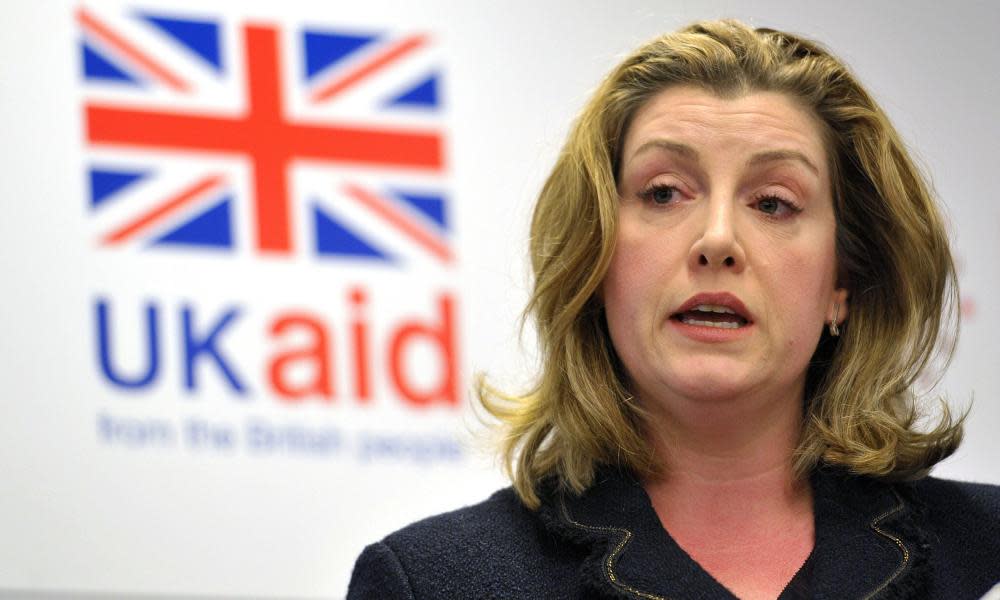Poorer countries must 'put their hands in their pockets': UK warns of cuts to aid

Britain will cut foreign aid to developing countries if they fail to invest in their own people, the international development secretary has said.
Penny Mordaunt said the British government, which gives out £13bn of foreign aid a year, “will not invest when others should be putting their hands in their pockets”.
Aid groups responded with concern, saying a “significant need” for aid remains across all low income countries, even among those who invest in health and social care.
Mordaunt said that the public had “nagging but legitimate doubts” about where aid money was going. She said it was no longer enough for a project just to be achieving good things.
“I want the governments of developing countries to step up and take responsibility for investing in their own people, in healthcare or education, for example. If [they choose] not to, that will inform our decisions around our funding. We will continue to prioritise investments in saving lives, tackling undernutrition, improving health and getting kids a quality education.
“But our focus will increasingly be on helping developing countries stand on their own feet and build sustainable health and education systems that they invest in themselves.”
In an interview for the BBC’s Today programme, Mordaunt said there was no incentive for a country to invest in healthcare if they are getting foreign aid.
The UK government launched a new aid strategy in 2015 following bitter criticism of development spending, including money given to middle-income countries India and China, which signalled a shift towards a more results-focused direction and a renewed emphasis on Britain’s national interest.
Mordaunt was appointed international development secretary in November, following Priti Patel’s resignation over her unofficial meetings with senior Israelis. She pledged to use foreign aid as part of a “Brexit-ready proposition to boost trade and investment with developing countries”.
While some aid groups said they agreed with the need for developing countries to invest in their own people, they warned of the danger of pulling away from those nations most in need of aid.
Romilly Greenhill, of the One Campaign, said: “It’s absolutely right that countries need to invest in their own people and they are doing that in many cases, in health and education. The evidence suggests that even if they collect taxes and invest in the health and social sector, there is still a significant funding gap across all low income countries. There remains a significant need for aid.”
Alex Thier, executive director of the Overseas Development Institute, said: “She is articulating a principle that we should focus more of our assistance on promoting sustainability and assistance so that countries can lift themselves up. I agree with that. However, it’s important to apply that to the people and countries where it is needed most. The goal should not be to pull away from countries that are struggling and only invest in countries that are doing well.”
Kate Osamor, the shadow secretary of state for international development, said “After Priti Patel, it is refreshing to see an International Development Secretary stand up for the UK’s record on aid. But spending even more of the UK’s aid budget on short-term national interest or propping up the budgets of other ineffective departments frankly sounds like more of the same.”
She said that extreme wealth and poverty co-exist in virtually every country in the world, with too many elites happy with the status quo.
“Rather than abandon the world’s poorest in these countries, the UK should do much more to tackle acute and growing inequality head-on.”
Daniel Bruce, the chief executive of Internews, a non-profit media company, warned that countries not investing in their own people is a symptom of bigger problems, such as unaccountable governance, weak civil society and limits on press freedom.
“Rather than arbitrarily cutting aid from countries not supporting their people, we need to strengthen their societies to hold their own governments to account. If we fail to do so, then the most vulnerable people on the planet will simply suffer all the more.”

 Yahoo News
Yahoo News 
